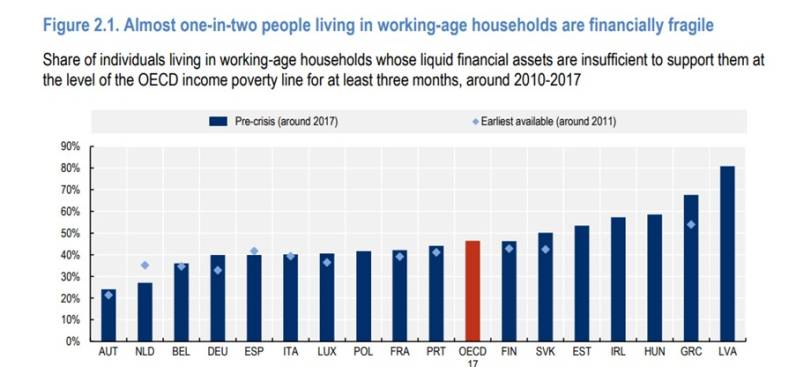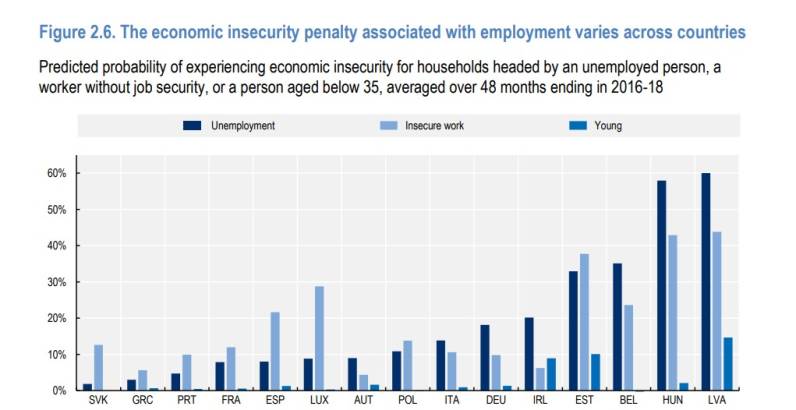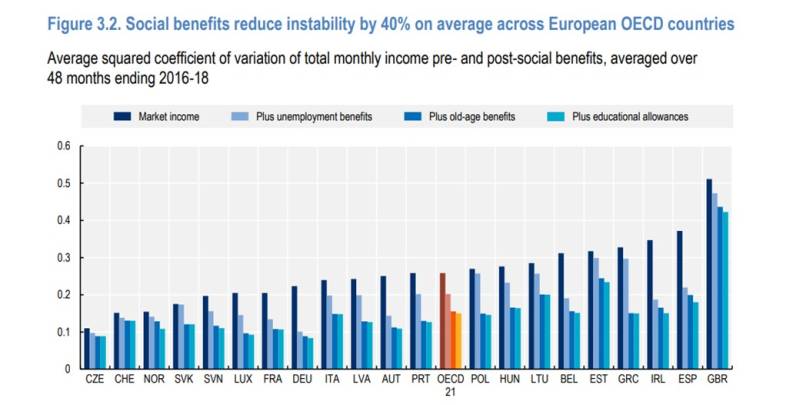Shaky jobs and economic insecurity: new OECD report
12 December 2023
A new OECD report “On shaky grounds? Income Instability and Economic Insecurity in Europe” shows that one in six households suffer highly unstable income flows and do not have sufficient funds to stave off poverty for three months.
“It is to the credit of the OECD that it draws attention to economic insecurity and the crucial role social benefits play in reducing it. The OECD should also promote policies to prevent economic insecurity - by creating more secure jobs to reduce precarious employment - and not only social benefits that just reduce the problem”
“It is shocking that one in six household suffer economic insecurity in one of the richest regions of the world” says Veronica Nilsson, General Secretary of TUAC. “At least in Europe relatively well-developed social protection systems do reduce economic insecurity, but not enough to prevent the stress to adults suffering economic instability or stop their children’s prospects being damaged by it.”
Unstable incomes Delving into the first factor of economic insecurity – unstable income flows- the report argues that unstable flows of income are not always negative. But only 1 in 5 individuals in European OECD working-age households experience increases in monthly income over a period of four years.
The report shows that unstable incomes and inequality go together. Countries with higher inequality display more income instability. For instance, households in the UK – a highly unequal economy – suffer double the income instability of the OECD (European) average.
People that have a job but not job security (temporary or self-employed workers) are most likely to experience income instability as well as the unemployed. Economic instability also has a clear gender dimension: single-income households, which are more often led by women than by men, are more exposed to income stability.
Insufficient savings to stay out of poverty for three months The OECD reveals that almost half (45%) of people living in working-age households do not have sufficient savings to keep them out of poverty for three months. A very high percentage of low-income households do not have enough assets to keep them afloat for 3 months – 70% in Ireland and Hungary 90% in Greece 90% and almost 100% in Latvia.
Economic insecurity hits 1 in 6 people The OECD estimates that 17% of people in working-age households are economically insecure, with Latvia, Hungary, Greece and Spain topping the bill. Another 13% have highly unstable incomes but enough savings to cushion themselves against poverty for three months (see graph). Combing these two figures suggests that a quarter of people in working-age households suffer high volatility in income.

OECD analysis demonstrates that having a job is not enough to avoid economic insecurity. What matters is also whether that job is secure. Workers who lack job security (temporary workers, self-employed workers) are especially at a high risk. Insecure work is most strongly associated with economic insecurity in Latvia, Hungary, Belgium, Spain, Luxembourg, Poland, France and the Slovak Republic (see graph).

Economic Insecurity reduces wellbeing and the quality of life and work People who are economically insecure expect the future to be bleak: almost 70% of them expect to lose their job in the next year compared to a quarter of those who are not economically insecure. They are more likely to be facing poor health, food insecurity, stress and anxiety, fractured family situations and political discontent. Over the longer term, income instability harms the prospects of the next generation: failure to devote sufficient resources for their children, together with exposure to parental stress, results in low educational attainment and weak labour force attachment of children growing up in low-income families.
Social benefits play a key role The OECD report stresses, the role of social protection systems in reducing income instability and the risk of economic insecurity. Across European OECD countries, social benefits reduce income instability by 40% on average (see graph). The UK is a noticeable outlier with social benefits having a limited impact, and this despite the fact that household income instability is at a record high.

For the full OECD report use this link
